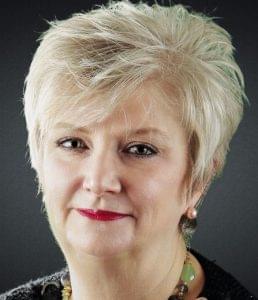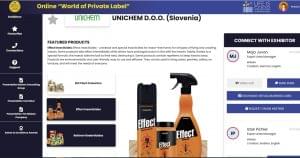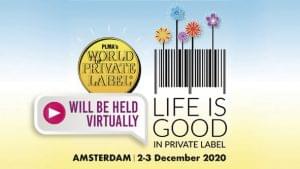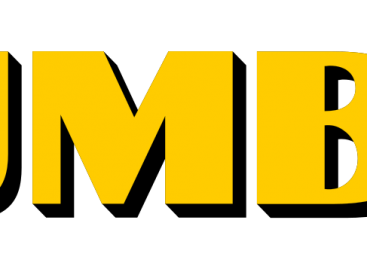Big numbers from the first PLMA online Show
On 1-4 December 2020 the Private Label Manufacturers Association (PLMA) organised the first and the biggest online ‘World of Private Label’ trade show. 1,060 exhibitors from 61 countries – among them 8 Hungarian companies – built their stands in the ‘cloud’ for nearly 2,000 purchasers, distributors and potential partners to visit.
PLMA stays open longer

Peggy Davies
president
PLMA
According the Private Label Manufacturers Association, the online event was successful for both the retailer and the manufacturer side. The online Show platform continues to be available until mid-April 2021. PLMA president Peggy Davies told: more than 2,500 video calls were made during the four days and more than 15,000 virtual business cards were exchanged. It is a good thing that the trade show stays open longer, because thousands of virtual business cards were handed over to potential partners since the official exhibition days too.
Visitors from 100 countries

Jan Van Lier
director
PLMA International
Trade Show
Nearly 2,000 purchasers from 100 countries checked in to the world’s biggest online private label B2B forum, which was titled ‘Life is good in Private Label’ – we learned from Jan Van Lier, PLMA’s international trade show director. The virtual stands generated more than 150,000 visits during the 4 official days of the trade show. New products were highlighted in the ‘Featured Products’ section.
Mr Van Lier explained: one of the advantages of an online trade show is global accessibility; another one is that things can be done quickly. On the contrary, buyers don’t get the chance to see, touch, taste and try the products they are interested in. There are pros and cons alike, but as long as the pandemic is raging, PLMA will continue to provide an online alternative to private label product manufacturers and retailers to do business.
Categories, segments and products
The organisers put products and services into 7 categories: food, pet food, health and beauty, household, home management and other, commercial suppliers, service providers. 67 percent of exhibitors were present in the food category.

The four days of the virtual trade show was organised by themes, so that purchasers, manufacturers and suppliers can organize meetings purposefully
Seven Hungarian companies brought their food products – Aloha, Cornexi, Felföldi, Hunorganic, Kecskeméti Canned Food, Popz and Sanaplus; Nagyhegyesi Animal Feed Kft also participated. Presentations were part of the online Show’s programme: Boston Consulting Group gave a 15-minute video presentation about innovations, titled ‘Private label – changing the game for manufacturers and retailers alike’. Tatiana Ryfer, Carrefour’s branding and visual identity manager spoke about the relationship between exterior-interior design and online content.

The show goes on
More online PLMA trade shows will follow this year. On 1-5 February 2021 there will be the ‘Private Label Week’ Online Trade Show for North America. Peggy Davies talked about her positive expectations for 2021. Although the 18-19 May 2021 date had to be cancelled, she hopes that in the second half of 2021 PLMA can host a physical ‘World of Private Label’ International Trade Show again in Amsterdam. //
Private labels and brands

Tom Penninckx
business partner
Nielsen Belgium
Nielsen gave a video presentation on the online trade show platform, analysing the latest FMCG and private label trends. Tom Penninckx, client business partner of Nielsen in Belgium told: the European FMCG market grew by 8-9 percent in 2020. Sales of branded goods developed faster than private label product sales – in both brick-and-mortar stores and online shops. The global market share of private labels is 16.3 percent; their share in Europe is 31.7 percent. There is great potential for private label sales growth in countries where their share is between 25 and 30 percent as in Hungary.
Covid-19: Winner and loser categories
Covid-19 generated new consumption habits. People went shopping 20% fewer times, but they put 40 percent more products in their baskets. Meat sales increased by 13.2 percent, vegetable sales were up 12.6 percent and product categories frequently used in home cooking such as flour, rice pasta and sugar underwent a 19.7-percent sales growth. 40 percent of products categories produced a two-digit sales growth. 22 percent of categories suffered a sales loss, e.g. decorative cosmetics, fresh salad and chewing gum. In the stockpiling period shoppers preferred well-known brands and comforted themselves with FMCG products during the crisis. Private label products were losers in nearly every category, with the exception of frozen food and confectionery where private label sales grew.
The future of private labels
Nielsen’s expert forecasted that the pandemic situation will improve by mid-2021 and in line with this consumers will become socially active. Nevertheless, the economic recession won’t go away instantly and this can contribute to the growth of private labels. According to an OECD report, the level of unemployment will go above 12 percent in Europe in early 2021, and the GDP will drop 7.9 percent. E-commerce will keep growing and its share in total retail can reach 18-21 percent. //
Related news
Jumbo rolls out new private label range in the Netherlands and Belgium
Jumbo has introduced a new private label range called Jumbo’s…
Read more >Lidl’s private labels have a big influence on the Portuguese economy
Lidl Portugal’s private label products contributed nearly EUR 1bn to…
Read more >Chain Bridge Club October exclusive: Even with high purchasing power, there are challenges: an up-close view of the Belgian market
Péter Szautner, managing director of FrieslandCampina gave an insight into…
Read more >Related news
Most major grocery chains will keep their stores open until noon on December 24th
Most of the large grocery chains will keep their stores…
Read more >Viktor Orbán: Economic recovery and historic opportunities for 2025
On Friday morning, Prime Minister Viktor Orbán presented the Hungarian…
Read more >Recognition of Consumer Protection Excellence: Honoring the Best of 2024
This year’s outstanding consumer protection officers and special award recipients…
Read more >








